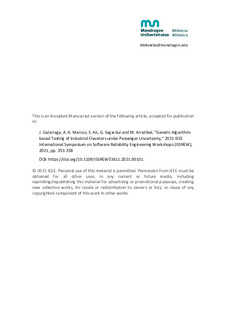
Izenburua
Genetic Algorithm-based Testing of Industrial Elevators under Passenger UncertaintyArgitalpen data
2021Beste erakundeak
Orona, S. Coop.Simula Research Laboratory
Bertsioa
PostprintaDokumentu-mota
Kongresu-ekarpenaKongresu-ekarpenaHizkuntza
IngelesaEskubideak
© 2021 IEEE. Personal use of this material is permitted. Permission from IEEE must be obtained for all other uses, in any current or future media, including reprinting/republishing this material for advertising or promotional purposes, creating new collective works, for resale or redistribution to servers or lists, or reuse of any copyrighted component of this work in other works.Sarbidea
Sarbide irekiaArgitaratzailearen bertsioa
https://doi.org/10.1109/ISSREW53611.2021.00101Non argitaratua
2021 IEEE International Symposium on Software Reliability Engineering Workshops (ISSREW) pp. 353-358, 2021Argitaratzailea
IEEEGako-hitzak
Elevators
genetic algorithms
Quality of Service
uncertainty ... [+]
genetic algorithms
Quality of Service
uncertainty ... [+]
Elevators
genetic algorithms
Quality of Service
uncertainty
passenger data
software in the loop simulation [-]
genetic algorithms
Quality of Service
uncertainty
passenger data
software in the loop simulation [-]
Laburpena
Elevators, as other cyber-physical systems, need to deal with uncertainty during their operation due to several factors such as passengers and hardware. Such uncertainties could affect the quality of ... [+]
Elevators, as other cyber-physical systems, need to deal with uncertainty during their operation due to several factors such as passengers and hardware. Such uncertainties could affect the quality of service promised by elevators and in the worst case lead to safety hazards. Thus, it is important that elevators are extensively tested by considering uncertainty during their development to ensure their safety in operation. To this end, we present an uncertainty testing methodology supported with a tool to test industrial dispatching systems at the Software-in-the-Loop (SiL) test level. In particular, we focus on uncertainties in passenger data and employ a Genetic Algorithm (GA) with specifically designed genetic operators to significantly reduce the quality of service of elevators, thus aiming to find uncertain situations that are difficult to extract by users. An initial experiment with an industrial dispatcher revealed that the GA significantly decreased the quality of service as compared to not considering uncertainties. The results can be used to further improve the implementation of dispatching algorithms to handle various uncertainties. [-]




















